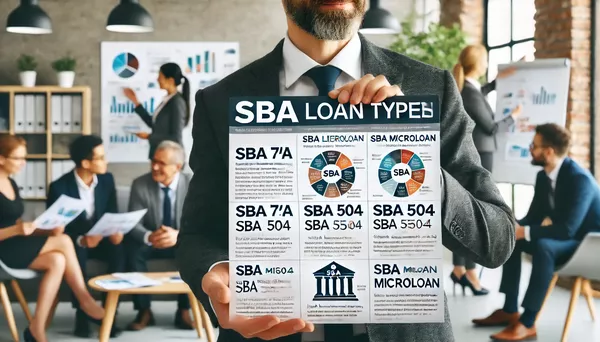Unlock Your Business Potential with an SBA Loan for Startups
Are you a startup looking for financing options? Considering an SBA loan might be your best bet. This comprehensive guide will walk you through how SBA loans can benefit your startup and the steps you need to take to secure one. With detailed insights into the different types of SBA loans and expert tips on preparing your application, you’ll be well-equipped to fast-track your success. Let’s get started!
Understanding SBA Loans
What is an SBA Loan?
An SBA loan is a government-backed loan designed to support small businesses. The main types include SBA 7(a) Loan, SBA 504 Loan, and SBA Microloan. These loans are not directly provided by the SBA but are guaranteed by them, which reduces the risk for lenders and makes it easier for small businesses to obtain financing.
For example, if you are starting a tech company and need funds to develop your product and cover initial operational costs, an SBA 7(a) loan could provide the necessary capital with favorable terms.
Benefits of SBA Loans for Startups

SBA loans offer several advantages that are particularly beneficial for startups:
- Low interest rates: SBA loans typically offer lower interest rates compared to conventional loans. This means you can save significantly on interest payments over time.
- Long repayment terms: These loans come with flexible and extended repayment options, which help manage cash flow. For instance, a 10-year repayment term can ease the financial burden on a new business.
- Small business support: SBA loans are designed to provide the necessary funding and support to help small businesses grow. This includes access to resources and mentorship programs.
Types of SBA Loans
SBA 7(a) Loan
The SBA 7(a) Loan is the most versatile option, suitable for a wide range of business needs:
- Flexible use: Funds can be used for working capital, purchasing equipment, or refinancing debt. For example, a restaurant startup might use this loan to buy kitchen equipment and cover initial operating expenses.
- Loan amounts: Up to $5 million.
- Suitable for: Businesses looking for a versatile financing solution.
SBA 504 Loan
The SBA 504 Loan is perfect for businesses planning major fixed asset investments:
- Fixed-rate financing: Ideal for purchasing real estate or large equipment. For instance, a manufacturing company might use this loan to buy a new warehouse.
- Loan amounts: Up to $5.5 million.
- Suitable for: Businesses looking to expand with significant capital investments.
SBA Microloan
The SBA Microloan program provides small, short-term loans for startups:
- Loan amounts: Up to $50,000. A small retail shop might use a microloan to purchase inventory or renovate its storefront.
- Suitable for: Startups needing smaller amounts for inventory, supplies, or working capital.
- Key features: Shorter repayment terms and typically lower borrowing amounts.

Preparing to Apply for an SBA Loan
Required Documents
To apply for an SBA loan, you need several key documents:
- Business plan: A comprehensive plan outlining your business goals and strategies. A well-prepared business plan can significantly increase your chances of approval.
- Credit score: Both personal and business credit scores. A higher credit score can result in better loan terms.
- Collateral: Assets to secure the loan, if required. This could include property, equipment, or other valuable assets.
- Additional documents: Financial statements, tax returns, and legal documents. Having these documents ready and organized will streamline the application process.
Application Form and Fee
Here’s a step-by-step guide to filling out the application form:
- Step-by-step guide: Start with basic business information, followed by detailed financial details. Ensure all information is accurate and up-to-date.
- Application fee: Some SBA loans may have a small application fee, which varies by lender. Check with your lender for specific details.
Credit Score and Business Plan
Your credit score and business plan are crucial for your SBA loan application:
- Credit score: A higher credit score increases your chances of approval. Aim to maintain a good personal and business credit history.
- Business plan: Ensure your plan is detailed, realistic, and aligns with SBA requirements. Highlight your business’s unique value proposition and growth potential.
The Application Process
Step-by-Step Guide
The SBA loan application process involves several key steps:
- Initial consultation: Meet with a lender to discuss your loan options and gather information.
- Document submission: Provide all required documents. Make sure everything is complete and well-organized.
- Review process: The lender reviews your application and submits it to the SBA for approval. Be prepared for possible follow-up questions or requests for additional information.
After Submission
Once your application is submitted:
- Expect a waiting period: The review process can take several weeks. During this time, the lender and SBA will evaluate your application.
- Approval and funding: If approved, the funds will be disbursed, allowing you to use them for your business needs. Make sure to follow up with your lender to stay informed about the status of your application.
Maximizing Your Chances of Approval
Expert Tips
To improve your chances of securing an SBA loan:
- Strong credit score: Maintain a good personal and business credit history. Paying bills on time and reducing outstanding debt can help improve your score.
- Detailed business plan: Make sure your business plan is thorough and well-prepared. Include market research, financial projections, and a clear strategy for growth.
- Avoid common mistakes: Ensure your application is complete and accurate. Double-check all information and documents before submission.
FAQs
- What documents do I need to apply for an SBA loan?
- Business plan, credit score, collateral, financial statements, and tax returns.
- What are the criteria for SBA loan approval?
- Creditworthiness, a solid business plan, and sufficient collateral.
- How long does it take to receive funds after approval?
- Typically a few weeks to a few months.
- What is the maximum amount I can borrow through an SBA loan?
- Up to $5 million for SBA 7(a) and 504 loans.
- What are the repayment terms and conditions?
- Varies by loan type, but generally long-term and low-interest.
- What are common mistakes to avoid during the application process?
- Incomplete applications and inaccurate information.
Conclusion
In summary, SBA loans can significantly benefit startups with their low interest rates and long repayment terms. If you’re ready to take your business to the next level, applying for an SBA loan might be the right step. Good luck, and may your startup journey be smooth and successful!